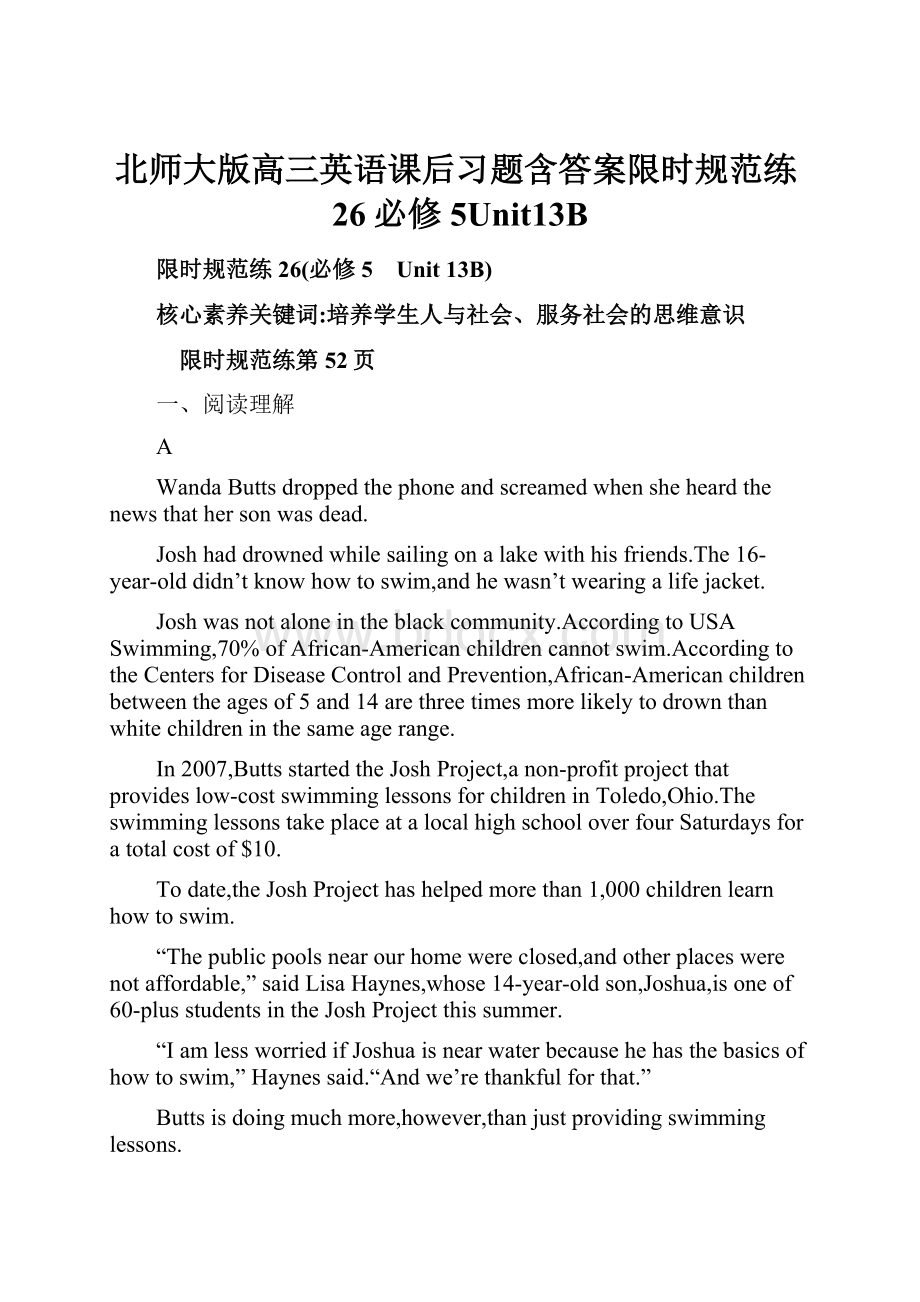北师大版高三英语课后习题含答案限时规范练26必修5Unit13B.docx
《北师大版高三英语课后习题含答案限时规范练26必修5Unit13B.docx》由会员分享,可在线阅读,更多相关《北师大版高三英语课后习题含答案限时规范练26必修5Unit13B.docx(11页珍藏版)》请在冰豆网上搜索。

北师大版高三英语课后习题含答案限时规范练26必修5Unit13B
限时规范练26(必修5 Unit13B)
核心素养关键词:
培养学生人与社会、服务社会的思维意识
限时规范练第52页
一、阅读理解
A
WandaButtsdroppedthephoneandscreamedwhensheheardthenewsthathersonwasdead.
Joshhaddrownedwhilesailingonalakewithhisfriends.The16-year-olddidn’tknowhowtoswim,andhewasn’twearingalifejacket.
Joshwasnotaloneintheblackcommunity.AccordingtoUSASwimming,70%ofAfrican-Americanchildrencannotswim.AccordingtotheCentersforDiseaseControlandPrevention,African-Americanchildrenbetweentheagesof5and14arethreetimesmorelikelytodrownthanwhitechildreninthesameagerange.
In2007,ButtsstartedtheJoshProject,anon-profitprojectthatprovideslow-costswimminglessonsforchildreninToledo,Ohio.TheswimminglessonstakeplaceatalocalhighschooloverfourSaturdaysforatotalcostof$10.
Todate,theJoshProjecthashelpedmorethan1,000childrenlearnhowtoswim.
“Thepublicpoolsnearourhomewereclosed,andotherplaceswerenotaffordable,”saidLisaHaynes,whose14-year-oldson,Joshua,isoneof60-plusstudentsintheJoshProjectthissummer.
“IamlessworriedifJoshuaisnearwaterbecausehehasthebasicsofhowtoswim,”Haynessaid.“Andwe’rethankfulforthat.”
Buttsisdoingmuchmore,however,thanjustprovidingswimminglessons.
“Sheupstheawareness,”saidShaunAnderson,aswimmingcoachwhowassoinspiredbyherstorythathecreatedaJoshProjectswimmingprogramatNorfolkStateUniversity.“Oncethesecommunitieslearnhowtoswim,theywillpassitdown,whichresultsinfuturegenerationsthatknowhowtoswim.”
Buttssaidshehastwowishesforthefuture:
OneistochangethedrowningnumbersofAfrican-Americanchildren,andtheotheristohaveaswimmingcenterwherethechildrencanswimdailyinsteadofjustonceaweek.
【篇章导读】本文是记叙文。
因为一次溺水事件失去儿子的WandaButts创建了一个教非裔美国儿童学习游泳的非营利构造。
1.WhatledtoJosh’sdrowning?
A.Hewasnevertaughtswimmingskills.
B.Hewaspoorinboatingskills.
C.Hegavehislifejackettoafriend.
D.Hewascarelesswhenswimminginthelake.
答案A
剖析细节明白题。
由第二段可知,因为不会游泳且未穿浮水衣,Josh在湖中与朋友们搭船飞行时溺亡。
2.WhydidtheauthorlistthenumbersinParagraph3?
A.Toshowchildrenunder14aremorelikelytodrown.
B.Toarguechildrenshouldlearnswimmingataveryyoungage.
C.ToshowmanyAfrican-Americanchildrenlackswimmingskills.
D.TointroducethedifferencebetweenAfrican-Americanandwhitechildren.
答案C
剖析推理判断题。
第三段主旨句为第一句,即Josh的情况在美国非裔群体中并不稀有。
接下来作者引用两个组织提供的数据来支持这个说法,70%的非裔美国儿童不会游泳,且在5到14岁年龄段的儿童之中,非裔美国儿童溺亡的人数要比白人儿童超过跨过几倍。
因此,这些数据是为了说明非裔美国儿童当中有很多人都不会游泳。
3.WhatcanwelearnabouttheJoshProject?
A.Ithasitsownswimmingpools.
B.Itprovideslessonsonlyinsummer.
C.Itserveschildrenagedfrom5to14.
D.Itsswimminglessonstakeplaceonceaweek.
答案D
剖析细节明白题。
由第四段中的“Theswimminglessons...fourSaturdays”以及最后一段中的“wherethechildren...justonceaweek”可知,该组织每周六开设游泳课程,一周一次。
4.WhatdidLisaHaynesthinkoftheswimminglessonstheJoshProjectprovides?
A.Expensive.
B.Helpful.
C.Interesting.
D.Difficult.
答案B
剖析推理判断题。
由倒数第四段中Haynes所说的话可知,她的儿子通过游泳课程学会了根本的游泳技能,她对此很感谢。
因此可推断,Haynes认为该公益组织开设的游泳课程很有效。
B
IrecentlywatchedawomanfilmherselfasshewalkedaroundanancientbuildinginSanSebastian,Spain.Theplacewasrichinhistoryandtheviewwasgreat.Butshewasn’tlookingattheblueseaortheoldhouses—shewaslookingathercamera!
Whatarewemissingbyseeinglifethroughsocialmedia?
I’mnotthefirstpersontoaskthatquestionbutI’llalsoadmitI’mpartofthe“problem”.Itakephotosofbeautifulplacesandenjoythemjustfortheirsocialmediavalue.
IrememberausuallycheerfulfriendofminegoingthroughhisFacebookfeedonedayduringaquietafternoonatwork.“I’msodepressed.Everyone’sgoingtothemostwonderfulplacesandhavingthemostwonderfultime,”hesaid.Exceptthey’reprobablynot.Onephotoshowsonemomentinaday.Peoplesimplydon’tpostaphotoofthetimewhentheygotintoafightwiththeirtaxidriver.
TakethedaythatIgotmore“likes”thanusualforapictureI’dpostedonInstagram.I’dgonetoatempleinJapanandspentthedayclimbinghundredsofstepstoseewhatturnedouttobearatherordinarytemple.Ihadseenalotoftemplesbythenandthisonewasabitdisappointing.Thatevening,Ipostedaphotoofanicecreamwithcolourfullittlesugarydecorationsonitandwassurprisedbyhowmanyofmy“followers”likedit.Butthaticecreamdidn’tsumup(概括)mydayandIfeltlikeabitofaliar.
Ofcourse,thatexperiencehasn’tstoppedmeusingsocialmedia.Icanseetheadvantagestoo—“connecting”withfriendsoverseas,takingphotostorememberthebeautyofamoment,sharingourexperiencesofnewplaces.Wewanttorememberthegoodmomentsoftravellingandsocialmediahelpsusdothat.Butlet’snotforgetthat’sonlyonepartoftravelling.Isthatphotoyoujustpostedasimportantasbeingthereinthatmomentandinthatplace?
【篇章导读】本文是议论文。
文章就旅行途中过度使用社交媒体的征象举行了讨论。
5.WhatpurposedoesParagraph1serveinthetext?
A.Togivesuggestions.
B.Tointroducethetopic.
C.Toexpressthemainidea.
D.Toofferbackgroundinformation.
答案B
剖析推理判断题。
第一段讲述了一个女游客的故事,她在一个景点自拍,眼光不停凝视着相机,而对周围美丽的景色和充满历史气味的修建不屑一顾。
作者通过这个故事引出了本文的话题,即旅游过程中过度利用交际媒体的题目。
6.Whywastheauthor’sfriendunhappy?
A.Hecouldn’tfinishhiswork.
B.Hegotintoafightwithothers.
C.Hecouldn’tenjoyhimselflikehisfriendswere.
D.Hegotfew“likes”forthepicturesonhisFacebook.
答案C
剖析细节明白题。
由第三段中的“goingthroughhisFacebook...atwork”以及“I’msodepressed...themostwonderfultime”可知,作者的这位朋友浏览交际媒体朋友圈之后,认为他的朋友们都去了很棒的地方,玩得很开心,而他却在工作,这让他感触很沮丧。
7.Howwastheauthor’sholidayinJapaninherInstagramfollowers’eyes?
A.Busy.B.Tiring.
C.Enjoyable.D.Disappointing.
答案C
剖析推理判断题。
由倒数第二段中的“surprisedbyhowmanyofmy‘followers’likedit”以及“thaticecreamdidn’t...abitofaliar”可知,虽然作者发布的美味冰激凌的照片不能反映她沐日的总体环境,但她社交媒体上的朋友们很喜好这张照片,并认为它反应了作者的沐日。
因此推断,在社交媒体上的朋侪们看来,作者在日本度假时很痛快。
8.Whatdoestheauthorthinkofusingsocialmediaduringtravelling?
A.Itmakestravellingmucheasier.
B.Itislessimportantthanenjoyingthejourney.
C.Itwillbecomemorepopularamongtravellers.
D.Itleadstomisunderstandingsaboutotherpeople.
答案B
剖析推理判断题。
由最后一段中的“Wewanttoremember...helpsusdothat”以及“Butlet’snotforget...inthatplace”可知,作者承认旅游时使用社交媒体可以帮人们记载优美时候,但她认为人们应该记住照片只是旅游的一部分,更重要的是享受一个地方带给你的切身体验。
二、完形填空
OnacoldafternooninJanuary2015,YeseniaDiosdado,11,gotoffaschoolbusinLenexa,Kansas,neartheapartmentbuildingwheresheliveswithherfamily.Whenthe 1 pulledaway,Yeseniasawpoliceandemergencyworkersattendingto 2 ofathree-caraccidentthathadhappenedatabusycrossroadsnearby.Yesenia 3 asmallcrowdofonlookersacrossthestreet.
Shenoticedthata(n) 4 womanwastryingto 5 withanEmergencyMedicalServiceworkerusingsignlanguage,buthecouldn’t 6 her.“Iheardhim 7 aninterpreter,”Yeseniasays.
Sheranovertotheparamedic(护理人员)to 8 —hermother,aformersignlanguageinterpreter,had 9 herandhersistershowto 10 (nooneinthefamilyishearing-impaired).
“Shesaid,‘Isign.CanIhelp?
’”saysEMScaptainChrisWinger.“Iwas 11 .”
Yeseniawasableto 12 totheemergencyworkerthatthewoman’sneckwasinjuredandtellthemthenameofthelocalhospitalshepreferred.“Shelookedreally 13 ,”saysYesenia.“I’mproudthatIgottodo 14 tohelp.”
Whenhermother,SusanMilidore,36,heardaboutYesenia’s 15 actions,shewasn’tsurprised.“It’sinher 16 tohelp,”saysSusan.“Iwasimpressedthatsherecognizedthe 17 ofthesituationandtookcharge.Mostadultswouldn’thave 18 that.”
Afewweekslater,paramedics 19 Yeseniawithagoldcoinandacertificateofappreciationatherelementaryschool.
“Mymomalwayssaysthatyou 20 knowwhensignlanguagemightcomeinhandy,”saysYesenia.“Thatday,itdid.”
【篇章导读】本文是记叙文。
美国堪萨斯州的一位十一岁女孩用手语挽救了别人的生命。
1.A.busB.car
C.trainD.ambulance
答案A
解析由上文的“YeseniaDiosdado...gotoffaschoolbus”可知,当“校车(bus)”离开Yesenia下车的地方后,她看到了正在处置惩罚中的交通事故。
2.A.studentsB.passers-by
C.crowdsD.victims
答案D
解析由下文提及车祸中的伤者可知,警察和急救人员正在照料三车相撞事故中的“受伤人员(victims)”。
3.A.visitedB.joined
C.passedD.interviewed
答案B
解析由下文Yesenia向伤者提供救济可知,她下了校车后“加入(joined)”到围观的人群中。
4.A.lostB.kind
C.injuredD.attractive
答案C
解析由下文的“thewoman’sneckwasinjured”可知,Yesenia注意到一个“受伤的(injured)”女士。
5.A.argueB.discuss
C.competeD.communicate
答案D
解析由usingsignlanguage和but一词的迁移转变可知,受伤的女士试图通过手语与急救人员“交流(communicate)”,但那位急救人员不“明白(understand)”她在说什么。
6.A.supportB.remember
C.recognizeD.understand
答案D
剖析见上题剖析。
7.A.callonB.askfor
C.replytoD.lookinto
答案B
解析由下文Yesenia提供救济可知,急救人员“请求要(askfor)”一名懂手语的翻译。
8.A.helpB.greet
C.watchD.wait
答案A
解析由下文Yesenia说“Isign.CanIhelp?
”可知,懂手语的Yesenia跑到护理人员面前去“帮忙(help)”。
9.A.missedB.written
C.taughtD.recorded
答案C
解析Yesenia的妈妈曾经是一位手语翻译者,故她“教会(taught)”Yesenia姐妹们如何“讲手语(sign)”。
10.A.shareB.sign
C.speakD.hear
答案B
剖析见上题剖析。
11.A.encouragedB.troubled
C.surprisedD.frightened
答案C
解析十一岁的小女孩会手语且能自动提供救济,这让ChrisWinger很“惊讶(surprised)”。
12.A.listenB.turn
C.explainD.announce
答案C
解析懂手语的Yesenia把受伤女人的手语意思“解释(explain)”给医护人员。
13.A.hurtB.calm
C.busyD.sleepy
答案A
解析由上文的“thewoman’sneckwasinjured”可知,那个女人“伤(hurt)”得很厉害。
14.A.anythingB.nothing
C.somethingD.everything
答案C
解析Yesenia对自己能给别人提供“一些(something)”救济而感触自大。
15.A.crazyB.brave
C.funnyD.careless
答案B
解析Yesenia主动给他人提供帮助是“英勇的(brave)”行为。
16.A.dutyB.nature
C.interestD.dream
答案B
解析由“hermother...wasn’tsurprised”可知,妈妈对Yesenia帮助他人的举动一点也不受惊,认为这是她的“天性(nature)”。
17.A.purposeB.advantage
C.importanceD.seriousness
答案D
解析车祸中的密斯受伤严峻,Yesenia能够意识到车祸的“严重性(seriousness)”并对此自动给予帮助,这让她的妈妈感觉颇深,因为很多成年人都不一定会这样“做(done)”。
18.A.metB.done
C.chosenD.accepted
答案B
剖析见上题剖析。
19.A.providedB.confused
C.presentedD.